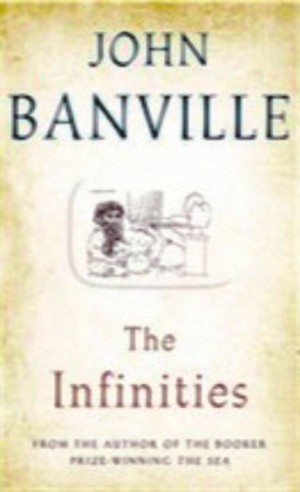Book Review
A Bright New Novel
 |
The Infinities
by John Banville
256, Picador |
Poetry, Ezra Pound liked to say, should be at least as well written as prose. Irish novelist John Banville has dedicated his writing life to turning Pound's prescription on its head. Banville made his name with his third book, Birchwood (1973), which treated his country's history as a bewildering black joke rather than something to be handled with patriotic reverence. Younger Irish writers, such as Colm Tóibín, have attested to Birchwood's bracing effect, but Banville was already moving in a different direction from most of his peers in Ireland, and indeed in many other places, with the great stylists of the mid-20th century at his elbow. Beckett's prose is plainly a cardinal influence, to which he's added the all-over descriptive polish, sensuous immediacy and functioning plots associated with Nabokov or Saul Bellow or John Updike. He's equally ambitious in the areas he goes to for metaphors and motifs: the Greeks and Romans, Shakespeare, 17th-century painting, German Romanticism; also mathematics, cosmology and physics.
At its best, Banville's writing is good enough to assimilate his daunting models into a formidably stylish voice of his own. His most effective books are usually narrated by posh Irish or Anglo-Irish types whose lordly, Humbert Humbert-like airs are offset by baffled self-questioning. In The Book of Evidence (1989) and The Untouchable (1997), the narrators' mandarin tones are also offset by their disreputable activities art theft, murder, spying. Some of his books, such as The Newton Letter (1982), a novella, work just as well without these sinister touches. But their absence sometimes makes his more recent novels seem oppressively overwrought, as though his narrative energy has all gone into the thrillers he's started writing as Benjamin Black. Effects that fit neatly into an atmosphere of moral ambiguity and dread the sharply perceived inanimate world and shadowy, stylised human figures; the inconclusive dialogue and static scene-construction can come across as mannered when brought to bear on less dramatically troubled lives.
His new novel, The Infinities, is his first since he finally won the Booker prize, for The Sea in 2005, and it serves as a kind of catalogue of his favourite themes and props. Its action takes place over a single day in a big, gloomy house in the middle of Ireland. The book's title is both a calculated paradox does it make sense to speak of more than one infinity? --and, it turns out, a reference to a problem that dates from the early days of quantum field theory, when it was found that certain types of calculation gave infinite results. A process called "renormalisation" was invented to get round this difficulty, but the world in which Banville's novel is set is, so to speak, un-renormalised. Old Adam, a physicist-mathematician, has solved the infinity problem in a way that's not only led to some useful inventions cars that run on brine, for example but also proved the existence of parallel universes, a category that includes the one he inhabits. In this novel, Sweden is a warlike country, and evolution and relativity have been discredited. The Greek gods are also alive and well, and taking an interest in Arden House; the narrator introduces himself as Hermes, while Zeus, disguised as young Adam, ravishes Helen in the course of the opening chapter.
Banville seems to have taken over this particular plotline from Heinrich von Kleist's play Amphitryon, which turns on the philosophical problems raised by the classical gods' ability to impersonate people exactly. The Infinities plays with similar themes: young Adam is given to worrying about "the mystery of otherness", and there's a question mark over the narrator's self-identity as well as, ultimately, the world's. At the same time, there are frequent reminders of the action's artificial nature, with the narrator acting as a kind of boastful dramaturge ("and it is I who have contrived these things"). "It is a nice conceit," the narrator says at one point, "is it not? I shall let him entertain it for the nonce." There are also allusions to Christian theology, Shakespeare and Nietzsche, aka "one of your most darkly glowing luminants".
This elaborate intellectual structure rests on skimpy dramatic foundations, however, and the book only really sparks into life when old Adam is recounting his memories. Describing a gloomily preening man visiting a prostitute, not long after his wife's suicide, in ghostly, out-of-season Venice: this is the kind of thing that Banville does well. The rest of the novel moves at a very slow pace, and whether he's making puns ("this mess of frottage") or writing prose that scans like poetry ("To us your world is what the world in mirrors is to you"), Hermes, if he is Hermes, overwrites shamelessly. Banville has shown before that a heavy gloss of style doesn't have to rule out artistic restraint and some resemblance to a speaking voice, but, sad to say, he doesn't do so here.
Copyright
(R) thedailystar.net 2009 |
